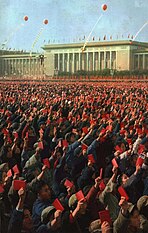Baizuo
| Part ofa serieson |
| Conservatism in China |
|---|
Baizuo(Chinese:Bạch tả;pinyin:báizuǒ,Mandarin pronunciation:[pǎɪ.tswò];literally "white left" ) is a derogatory Chineseneologismused to refer to Western liberals and leftists, especially in relation to refugee issues and social problems. It can also be used to mock anyone perceived as naively moralistic in general.[1]The term originated in the 2010s and has since come into more frequent use by Chinese nationalists critical of Western liberal and leftist ideologies for their alleged over-tolerance to immigration issues and by netizens who agreed withDonald Trump's anti-immigration policies. The term has begun to beusedin English as well byAmerican conservatives.
Etymology
[edit]The word is made up of two Chinese morphemes,Bạch(bái, "white" ) andTả(zuǒ, "left" ).[2]Although the word is most commonly used in its literal sense, it is sometimes used to mean idiotic (Bạch si) liberals.[3]It is believed that the word came from China's netizens.[3]An article from theSouthern Metropolis Dailygoes further, referring to the term as originating from a 2010 article, "The Fake Morality of the Western 'White Left' and the Chinese 'Patriotic Scientists'",[a]written by Li Shuo, aRenren Networkuser. He satirizes the foreign left-wing youths who came to China before 1949 to help theChinese Communist Revolutionwhile being sympathetic to communism.[4][b]On the other hand, Chenchen Zhang believes the term only dates back to about 2015 when, with therefugee crisis in Europeand the rise ofright-wing populism in the United States,the term became popular as Chinese netizens criticized the leftist and liberal views in the West. Zhang summarizes the commonality of hundreds of relevant responses onZhihu,which accusesbaizuoof being hypocritical humanitarians who advocate for peace and equality only to "satisfy their own feeling of moral superiority"; of caring only about topics such asimmigration,minorities,andLGBT rights;of tolerating the "regressive values"ofIslamfor the sake ofmulticulturalism;of supporting thewelfare stateat the expense of tolerating lazy people; and of being "ignorant and arrogant westerners" who "pity the rest of the world and think they are saviours".[5]
The initial popularity of the term has been attributed by several surveys to overseas Chinese communities, often high-technology practitioners or small business owners. Yinghong Cheng, a professor of World History at Delaware State University whose research is focused on "modern and contemporary Chinese history in global context",[6]claims the term's spread to be a result of their lack of education in humanitarian equality, and, because of their life experience of hard work in the West, that they are uncomfortable and even hostile to new concepts and doctrines in religion, gender, sexuality and family.[7]Three meanings of the term have been specified through analysis: the term represents a perceived racial distinction in the globalracial hierarchyby the Chinese people; through the term, the racialotherhas been identified as a racial traitor; the term refers to a group of people who are perceived to have a destructive influence on developed civilizations, including China, and Chinese nationalists must take the side of the global rightists against the damage leftists allegedly cause to civilization.[8]It is also related to another term,shèngmǔ(simplified Chinese:Thánh mẫu;traditional Chinese:Thánh mẫu;pinyin:shèngmǔ;literally "Holy Mother" ), a reference to those whose political opinions are perceived as being sympathetic towards immigration. These words have analogies with English words likelibtard,but they also partially encompass the Chinese view of classical Western culture.[9]
Usage
[edit]2015 European migrant crisis
[edit]
The term comes up often under topics related to the2015 immigration crisis in Europeand is often used to accuse European politicians of being overly tolerant in their treatment of refugees.[10]While some praised the decision of Austria and Germany to open their borders to refugees to welcome those stranded in Hungary afterAlan Kurdi's death,just as many accused it of leading to chaos, with the subsequentNew Year's Eve sexual assaultconsidered a solid piece of evidence that Chinese netizens blamed on the "white left" ideology of Europe and compared to the parable ofThe Farmer and the Viper.[9]In mid-2016, anAmnesty Internationalquestionnaire showed that 94 percent of Chinese were willing to accept refugees, yet already in mid-2015, a Weibo blogger observed that it was "politically correct"to mockMerkelor other "leftist" politicians on Weibo because of their moderate platforms for refugees.[11]Amnesty International's paper elicited a fierce reaction, and an ensuingGlobal Timespoll showed that 90.3 percent of Internet users did not want to accept refugees, leadingGlobal Timesto call Amnesty International's survey "peculiar" and an attempt to "incite antagonism against the government among the public".[12]
World Refugee Dayon June 20, 2017, experienced another similar event whenYao Chen,China's firstUNHCRGoodwill Ambassador, held a charity event in Beijing at which the filmWelcome to Refugeestanwas screened, and later that day, the UN Human Rights Office celebrated the event by making a post on Weibo, and official Chinese media outlets posted in support. However, a large number of netizens voiced their opposition and believed that the initiative was a way to pressure China to accept refugees, and some rumors claimed that the construction ofrefugee campshad already begun in some areas of China.[13]On June 22, the GuangdongCommunist Youth Leaguecreated a similar questionnaire asking netizens if they were willing to support the Chinese government's acceptance of Middle Eastern refugees and this time, only about 0.5 percent said they did.[14]On June 23, Chinese Foreign MinisterWang Yi,in a meeting with the Lebanese Foreign MinisterGebran Bassil,stressed that refugees are not migrants and that they will all eventually return to their home countries. On June 26, Yao apologized and expressed her agreement with Wang's view.[15]
Several nationalist narratives—some of them identical to theright-wing populismof the West—have been observed alongside the term online, such as the belief that the introduction of immigrants will lead to thereplacement of majority ethnic groups,anti-elitism,opposition to mainstream media sentiment,identitarianism,national rejuvenation,nativism,social Darwinismandpragmatism,[16]with the term being used as a keyrhetorical deviceto chain these ideas together.[17]Chinese netizens have adopted the narrative thatintervention from the United States and the Westinstigated theSyrian civil warand caused the refugee crisis and therefore accuse Western countries of hypocrisy on the refugee issue.[18]In addition, due to theone-child policyimplemented in China, the introduction of immigrants is more likely to be seen as an act, at least in the imagination, of displacing the majority ethnic groups.[19]
Donald Trump 2016 presidential campaign
[edit]Donald Trumpannounced his candidacy for the U.S. presidency in 2015. His right-wing electoral strategy has appealed not only to Chinese nationalists but also to manyChinese liberals.[20]For nationalists, Trump's populist, anti-immigrant campaign has appealed to them, though that appeal is also noted as more of an opposition toAmerican liberalismor evenliberal democracyitself.[21]Over time, the term has come to be used to describe people who uphold similar policies, such asBarack Obama,rather than focusing on their race.[22]For Chinese liberals, or at least some of them, Trump's toughness and conservatism toward China have appealed to them, and they want to use similar conservative ideas to promote a liberal democratic system in China. Both liberals who support Trump and those who criticize him invoke cases like theCultural Revolutionor theGreat Leap Forwardas an overall critique of leftists and believe that theAmerican leftwill similarly lead to these happening in the United States. The former equate theremoval of Confederate memorialswith the destruction of theFour Olds,Black Lives Matteractivists with theRed Guards,andMeToowith thebig character posterorstruggle session.They draw the conclusion that the "white left" is wreaking devastation on America through these analogies. The latter, though, connect Trump's populism toMaoism.[23]
Similar to the case during the 2015 European migrant crisis, the support for American right-wing populism has also been seen as a result of Chinese pragmatism.[24]For nationalists, the use of the term is accompanied by expressions of China's rise and sense of competition.[2]For liberal intellectuals, the criticism of the "white left" and the praise of Trump also represent their non-nationalist sentiment and pro-market sentiment.[25]
Usage by American conservatives
[edit]In fact, they have a name for our self-hating professional class. They call thembaizuo.The rough translation from Mandarin is 'white liberal', and it is definitely not a compliment.[26]
Tucker Carlson,March 20, 2020
Since the popularity of the term in China, conservatives in the United States, especially nationalist conservatives, have also begun to use the term. Prominent conservativesTucker CarlsonandRod Dreherhave used the term to criticize American leftist and liberal ideas. In March 2020, Carlson introduced the term on histelevision show,while Dreher used "baizuocracy" to describe "white leftist government". The use of the term has been described as embodying a shift in the attitudes among a section of the American right that now expresses admiration for China and believes that it will prevail over the liberal-leaning United States.[27]There are claims that American conservatives misuse the term and ignore the debate aboutChinese nationalismand "geopolitical Darwinism".[26]
Laissez-faire in usage
[edit]Despite its possibleracist elements,the use of this term does not appear to becensored by the Chinese government,possibly because it contributes to the development of a sense ofcyber-nationalismon the Chinese internet.[28]Zhang Chenchen believes that this laissez-faire is due to the government's tolerance and even encouragement of discussions that portray the West as divided and in decline as a result of democratic politics. She states this means that the government wants to see netizens portray Western politicians as hypocritical and self-serving on human rights issues.[29]
See also
[edit]Notes
[edit]- ^simplified Chinese:Tây phương "Bạch tả" hòa trung quốc "Ái quốc khoa học gia" đích ngụy đạo đức;traditional Chinese:Tây phương "Bạch tả" hòa trung quốc "Ái quốc khoa học gia" đích ngụy đạo đức;pinyin:Xīfāng báizuǒ hé zhōngguó àiguó kēxuéjiā de wěidàodé
- ^According to Li Shuo's original article, he refers toErwin EngstandJoan Hinton.
- Li 2010:"Cổ nhân vân" lai nhi bất vãng phi lễ dã ", thiên triều bất đãn tại vật lưu thượng bị mỹ đế phi lễ, nhất thuyền thuyền đích hóa chân giới thật đích thương phẩm vận đáo mỹ quốc khứ, hoán lai đích khước thị đôi tích như sơn đích minh tệ ( kiến 《 nhân dân tệ? Nhân minh tệ! 》 ), nhân lưu thượng dã bị mỹ đế phi lễ, nhất phi cơ nhất phi cơ hóa chân giới thật đích đích tri thức phân tử vận đáo mỹ quốc khứ, hoán hồi lai đích thị linh tinh đích" ái quốc khoa học gia "Dĩ cập canh vi hãn kiến đích" bạch tả ", tiền giả dĩ tiền học sâm, tiền vĩ trường, tiêu quang diễm vi đại biểu, hậu giả dĩ dương tảo, hàn xuân phu phụ vi đại biểu." [As the old saying goes, "It is impolite not to reciprocate," but not only is the Celestial Empire being treated impolitely by the American Empire in terms of logistics – a boatload of genuine goods shipped to the United States, in exchange for a mountain of hell money (see "People's Currency? People's Hellish Currency!" ) – but also being treated impolitely in terms of people – a plane of genuine intellectuals were shipped to the United States in exchange for a smattering of "patriotic scientists" and the even rarer "white left", the former is represented by Qian Xuesen, Qian Weichang and Xiao Guangdian, and the latter by Erwin Engst and Joan Hinton.]
References
[edit]Citations
[edit]- ^Huang, Frankie (7 August 2024)."'Baizuo' Is a Chinese Word Conservatives Love ".Foreign Policy.Archivedfrom the original on 8 June 2023.Retrieved5 August2024.
- ^abHuang 2021.
- ^abWang 2019,p. 69.
- ^Xu 2020.
- ^Zhang 2017.
- ^Cheng 2024.
- ^Cheng 2019,p. 284.
- ^Cheng 2019,pp. 280–281.
- ^abGan 2020,p. 25.
- ^Gan 2020,p. 25;Zhang 2020,p. 96;Lin 2021,pp. 95–96.
- ^Shen 2020,p. 26;Zhang 2017.
- ^Zhang 2017;Gan 2020,p. 21.
- ^Shen 2020,pp. 26–27;Gan 2020,p. 26.
- ^Shen 2020,p. 28.
- ^Wang 2020,p. 130.
- ^Gan 2020,p. 25;Zhang 2020,pp. 101–104.
- ^Zhang 2020,p. 100.
- ^Shen 2020,p. 29;Zhang 2020,p. 101.
- ^Wang 2020,p. 137;Shen 2020,pp. 29–30.
- ^Lin 2021,pp. 85–86;Zhang 2020,p. 96.
- ^Lin 2021,p. 86;Zhang 2020,p. 96;Carlson 2018.
- ^Chen 2022,p. 176.
- ^Hendriks-Kim 2023;Lin 2021,pp. 88, 95–96;Gao 2023,pp. 27, 39–40.
- ^Zhang 2017;Lin 2021,p. 86.
- ^Lin 2021,p. 90.
- ^abWong 2022.
- ^Wong 2022;Weigel 2021.
- ^Zhang 2020,p. 108;Chen 2022,pp. 175–176.
- ^Cheng 2019,p. 285.
Sources
[edit]- Carlson, Benjamin (8 February 2018)."China Loves Trump".The Atlantic.Retrieved17 April2023.
- Chen, Ge (2 January 2022)."How equalitarian regulation of online hate speech turns authoritarian: a Chinese perspective".Journal of Media Law.14(1): 159–179.doi:10.1080/17577632.2022.2085013.S2CID249942141.
- Cheng, Yinghong (2019).Discourses of race and rising China.Cham, Switzerland:Palgrave Macmillan.ISBN978-3-030-05357-4.
- Gan, Chun (February 2020)."Discourse on Europe's Migrant Crisis in Chinese Social Media: Recontextualising Nationalism and Defending Perceived Homogeneity".China Report.56(1): 19–38.doi:10.1177/0009445519895614.S2CID213609606.Retrieved17 April2023.
- Gao, Gengsong (April 2023)."Chinese Centrist Liberal Critics of Trump: A Reconsideration of Contemporary Chinese Liberalism".Journal of Current Chinese Affairs.52(1): 25–49.doi:10.1177/18681026221103280.ISSN1868-1026.S2CID250234429.
- Hendriks-Kim, Eric (January 2023)."Why China Loves Conservatives".First Things.Retrieved20 April2023.
- Huang, Frankie (27 March 2021)."'Baizuo' Is a Chinese Word Conservatives Love ".Foreign Policy.Retrieved16 April2023.
- Li, Shuo (2010)."Tây phương" bạch tả "Hòa trung quốc" ái quốc khoa học gia "Đích ngụy đạo đức"[The Fake Morality of the Western "White Left" and the Chinese "Patriotic Scientists" ].Renren Network(in Simplified Chinese). Archived fromthe originalon 22 October 2012.Retrieved16 April2023– viaBoxun.
- Lin, Yao (2 January 2021)."Beaconism and the Trumpian Metamorphosis of Chinese Liberal Intellectuals".Journal of Contemporary China.30(127): 85–101.doi:10.1080/10670564.2020.1766911.S2CID216155640.Retrieved17 April2023.
- Shen, Qinna (2020)."Merkel the German" Empress Dowager "? Reactions to the Syrian Refugee Crisis in China and other East Asian Countries".Transit.12(2): 23–46.doi:10.5070/T7122047466.S2CID236839652.Retrieved17 April2023.
- Wang, Jing (31 December 2020)."Limits of Multicultural Imagination and the Anti-Refugee Controversy in Contemporary China".Journal of Contemporary Eastern Asia.19(2): 125–147.doi:10.17477/jcea.2020.19.2.125.Retrieved17 April2023.
- Wang, Xingfu (2019)."Critical Theory in Regressive Times: Liberalism, Global Populism and the" White Left "in the Twenty-First Century".Acta Universitatis Lodziensis. Folia Philosophica. Ethica-Aesthetica-Practica.34:67–77.Retrieved16 April2023.
- Weigel, David (2 December 2021)."Analysis | The Trailer: In three swing states, abortion bans could be on the midterm ballot".Washington Post.ISSN0190-8286.Retrieved25 January2022.
- Wong, Mason L. (17 October 2022)."Confucius Envy".Commonweal Magazine.Retrieved20 April2023.
- Xu, Chaoyi (24 June 2020)."Nhĩ khẩu trung đích" bạch tả ", chỉ đích cứu cánh thị thùy?"[Who are you referring to when you say "white left"?].Toutiao(in Simplified Chinese).Southern Metropolis Daily.Archived fromthe originalon 20 April 2023.Retrieved16 April2023.
- Zhang, Chenchen (11 May 2017)."The curious rise of the 'white left' as a Chinese internet insult".openDemocracy.
- Zhang, Chenchen (March 2020)."Right-wing populism with Chinese characteristics? Identity, otherness and global imaginaries in debating world politics online".European Journal of International Relations.26(1): 88–115.doi:10.1177/1354066119850253.S2CID181854953.Retrieved17 April2023.
Further reading
[edit]- Mair, Victor(17 May 2017).""White left" — a Chinese calque in English ".Language Log.University of Pennsylvania.Archivedfrom the original on 21 May 2017.Retrieved1 May2020.
- Mair, Victor(22 March 2021).""White left" — a Chinese calque in English, part 2 ".Language Log.University of Pennsylvania.Retrieved20 April2023.
- Zhang, Chenchen (24 April 2024)."Race, gender, and Occidentalism in global reactionary discourses".Review of International Studies:1–23.doi:10.1017/S0260210524000299.ISSN0260-2105.Retrieved25 May2024.
- Anti-immigration politics in China
- Anti-Islam sentiment in China
- Anti-LGBT sentiment in Asia
- Chinese Internet slang
- Criticism of multiculturalism
- Criticism of feminism
- Criticism of political correctness
- Linguistic controversies
- Political neologisms
- Political pejoratives for people
- Right-wing populism in China
- 2010s neologisms
- Pejorative terms for white people



